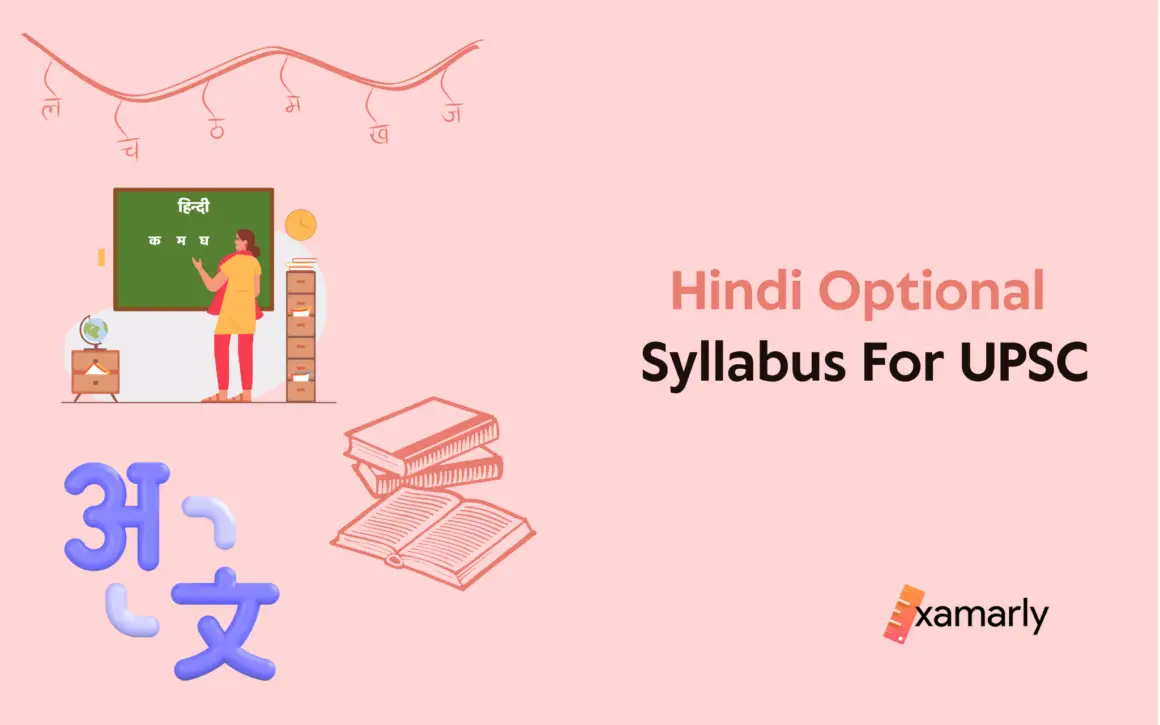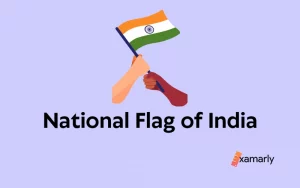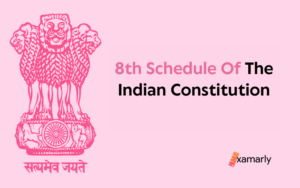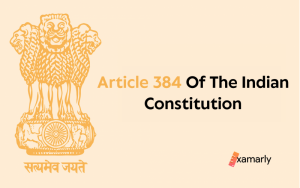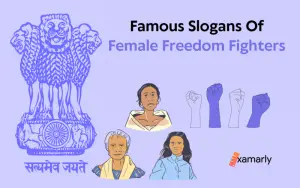Let us talk about Hindi optional syllabus for UPSC. But first, let us reflect on the soul of this beautiful and old language. In India, Hindi is one of the most widely spoken languages and is understood by the vast majority of people. Along with English, the Hindi language is used by the Indian government as one of the official languages for internal communications. In UPSC Mains Exam Hindi is included in the optional literature subject list for the Mains IAS Exam. Hindi optional for UPSC is also an option for the compulsory paper in IAS Mains.
The collection of literature in Hindi is huge and includes both fiction and non-fiction in the form of poetry, prose, and essay collections, as well as works of science and religious epics. The literature on the different dialects of Hindi is covered in the UPSC Syllabus.
The history of Hindi as the national language during the liberation movement, the evolution of Hindi as Devanagari script from ancient scripts used in the subcontinent, the history of the Hindi language, Nagari Lipi, Katha Sahitya, and the entirety of Hindi grammar are all covered in this subject’s syllabus. Additionally, it concentrates on various well-known writers and their works and literary criticism of other Hindi works.
The Hindi Literature paper carries 500 marks and is divided into two papers each of 250 marks. Let us go through the Hindi optional syllabus for UPSC in detail.
Hindi Optional Syllabus For UPSC Paper-I:
The syllabus for Hindi Literature Optional Paper- I for UPSC CSE is given below-
I. History of Hindi Language and Nagari Lipi
- Grammatical and Applied forms of Apbhransh, Awahatta & Arambhik Hindi.
- Development of Braj and Awadhi as Literary languages during the Medieval Period.
- Early form of Khari-Boli in Siddha Nath Sahitya, Sant Sahitya, Khusero, Rahim, etc., and Dakhni Hindi.
- Development of Khari-Boli and Nagari Lipi during the 19th century.
- Standardization of Hindi Bhasha and Nagari Lipi.
- Development of Hindi as a National Language during the freedom movement.
- Development of Hindi as a National Language of the Union of India.
- Scientific and Technical development of the Hindi Language.
- Prominent Dialects of Hindi and their inter-relationship.
- Salient features of the Nagari Lipi and the efforts for its reform and standard form of Hindi.
- Grammatical Structure of standard Hindi.
II. History of Hindi Literature
- The relevance and importance of Hindi Literature and tradition of writing History of Hindi Literature.
- Literary trends of the following four periods of the history of Hindi Literature-
a) Adikal- Sidh, Nath and Raso Sahitya
Prominent Poets- Chandvardai, Khusaro, Hemchandra, Vidyapati.
b) Bhaktikal-Sant Kavyadhara, Sufi Kavyadhara, Krishna Bhaktidhara and Ram Bhaktidhara.
c) Ritikal- Ritikavya, Ritibadhhyakavya and Riti Mukta Kavya
Prominent Poets-Keshav Bihari, Padmakar, Ghananand.
d) Adhunik Kal- Renaissance, the development of prose, Bharatendu Mandal
Prominent Writers- Bal Krishna Bhatt, Bharatendu Mandal, Pratap Narain Mishra
Prominent trends of modern Hindi poetry: Chhayavad, Pragativad, Prayogvad, Nari Kavita, Navgeet and contemporary poetry, and Janvadi Kavita.
Prominent Poets- Maithili Sharan Gupta, Prasad Nirala, Mahadevi, Dinkar, Agyeya, Muktibodh, Nagarjun.
III. Katha Sahitya A. Upanyas & Realism B. The origin and development of Hindu Novels
C. Prominent Novelists- Pemchand, Jain-endra, Yashpal, Renu, and Bhism Sahani.
D. Prominent Short Story Writers- Premchand, Prasad, Agyeya, Mohan Rakes,h and Krishna Sobti
IV. Drama and Theatre
A. Origin and development of Hindu Drama.
B. Prominent Dramatists- Jagdish Chandra Mathur, Bharatendu, Prasad, Ram Kumar Verma, Mohan Rakesh.
C. The Development of Hindu Theatre.
V. Criticism
A. The origin and development of Hindi criticism: Siddhantik, Vyavharik, Pragativadi, Manovishleshanvadi, and Nai Alochana.
B. Prominent critics- Ramchandra Shukla, Hajari Prasad Dwivedi, Ram Vilas Sharma & Nagendra.
VI. The other forms of Hindi Prose– Lalit Nibandh, Rekhachitra, Sansmaran, Yatra-Vittantra.
See Also – Importance of Regional Language
UPSC Hindi Literature Syllabus for Optional Paper-II:
The syllabus for Hindi Literature Optional Paper- II for UPSC CSE is given below-
Section A
- Kabir: Kabir Granthawali, Ed. Shyam Sundar Das (First Hundred Sakhis)
- Soordas: Bhramar Gitsar, Ed. Ramchandra Shukla (First Hundred Padas)
- Tulsidas: Ramchrit Manas (Sundar Kand), Kavitawali (Uttarakhand)
- Jayasi: Padmawat Ed. Shyam Sundar Das (Sinhal Dwip Khand & Nagmavativiyog)
- Bihari: Bihari Ratnakar Ed. Jagannath Prasad Ratnakar (First Hundred Dohas)
- Maithili Sharan Gupta: Bharat Bharati
- Prasad: Kamayani (Chinta and Shraddha Sarg)
- Nirala: Rag-Virag Ed. Ram Vilas Sharma (Ram ki Shakti Puja & Kukurmutta)
- Dinkar: Kurukshetra
- Agyeya: Angan Ke Par Dwar (Asadhya Veena)
- Muktiboth: Brahm Rakhashas
- Nagarjun: Badal Ko Ghirte Dekha Hai, Akal Ke Bad, Harijan Gatha
Section B
- Bhartendu: Bharat Durdasha
- Mohan Rakesh: Asadh Ka Ek Din
- Ramchandra: Chintamani (Part 1), (Kavita Kya Shukla Hai, Shraddha Aur Bhakti)
- Dr. Satyendra: Nibandh Nilaya- Bal Krishna Bhatt, Premchand, Gulab Rai, Hajari Prasad Dwivedi, Ram Vilas Sharma, Agyeya, Kuber Nath Rai.
- Premchand: Godan, Premchand ki Sarvashrestha Kahaniya Ed. Amrit Rai/ Manjusha.
- Prasad: Skandgupta
- Yaspal: Divya
- Phaniswar Nath Renu: Maila Anchal
- Mannu Bhandari: Mahabhoj
- Rajendra Yadav: Ek Dunia Samanantar (All Stories)
Related – 92nd Amendment Of Indian Constitution
UPSC Hindi Literature Syllabus: Booklist
For your ease of exam preparation, we have divided the Hindi Literature Books for UPSC according to the UPSC Hindi Literature Syllabus
- NCERT Class XI – Sahitya Shastra Parichay
- Hindi Sahitya Ka Saral Itihas – Dr. Vishwanath Tripathi
- Hindi Sahitya Ka Itihas – Dr. Nagendra
- Hindi Bhasha – Dr. Hardev Bahri
- Sahitya Ka Vastunishth Etihas – Saraswati Pandey
- History of Hindi literature, Katha Sahitya, Drama & Theater, Criticism, and other forms of Hindi prose—Lalit Nibandh, Rekhachitra, Sansmaran, Yatra-Vrittant.
- Chhayavad – Dr. Namvar Singh
- Kabir – Hazari Prasad Dwivedi
- Kavita Ke Naye Pratiman – Dr. Namvar Singh
- Hindi Sahitya Aur Samvedna Ka Vikas – Dr. Ramswaroop Chaturvedi.
UPSC Hindi Literature Exam Pattern 2022
Candidates must go through the Hindi Literature Optional Syllabus & exam pattern to get an idea about expected questions, topic weightage, and their difficulty levels. Check the UPSC syllabus and UPSC exam pattern and marking system and prepare for the exam accordingly.
The Preliminary Exam including general studies and aptitude test will be of a total of 400 marks. Candidates have to clear the preliminary exam to be eligible for the mains exam.
UPSC mains consist of many optional papers and Hindi Optional is one of them.
Exam pattern of UPSC Hindi Optional-
| Mains Papers | Subject | Marks |
| Paper VI | Optional Subject Paper- I | 250 |
| Paper VII | Optional Subject Paper- II | 250 |
| Total | 500 | |
| Time Duration | 3 Hours (180 Minutes) |
Hindi Literature Optional is a part of the UPSC IAS mains exam. Hindi Literature subject consists of two papers, Paper I & II 250marks each with a total of 500 marks and with a time duration of 3 hours.
How to Prepare for the UPSC Hindi Literature Optional Subject?
UPSC Hindi Literature Syllabus – Preparation Tips
- First of all, it is important to cover the entire syllabus, read the texts in their original and native languages and practice lots of questions to develop the right kind of language fit in your answer.
- Have a good vocabulary and knowledge about the usage of words in the Hindi Language.
- Solve the previous year’s UPSC Mains Exam question papers.
- Go through the Hindi Literature Optional Syllabus & exam pattern to get an idea about expected questions, topic weightage, and their difficulty levels.
- While writing your answers add quotations and suitable examples of various writers and poets which are relevant to the context and keep the language simple.
- The portion on Hindi literature’s history and timeline of Hindi literature is crucial and has to be covered in detail. This will also help you with papers I and II.
- Candidates need to improve their speed, accuracy, and time management skills. Attempting the UPSC Test Series could help candidates to practice all of their skills.


